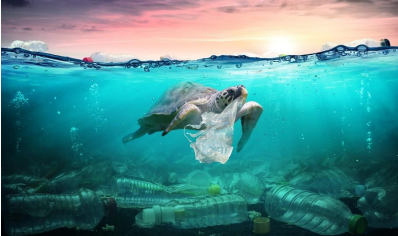Ahmedabad
(Head Office)Address : 506, 3rd EYE THREE (III), Opp. Induben Khakhrawala, Girish Cold Drink Cross Road, CG Road, Navrangpura, Ahmedabad, 380009.
Mobile : 8469231587 / 9586028957
Telephone : 079-40098991
E-mail: dics.upsc@gmail.com

Plastic Waste
Context: India supports regulating rather than completely eliminating single-use plastic, as outlined in an analysis by the Centre for Science and Environment ahead of global negotiations in Toronto involving 192 countries.
Agenda of the Toronto Meeting:
• Of the nearly 17 topics under consideration at the global negotiations:
• One key focus area is \'problematic and avoidable plastic products,\' particularly
single-use plastics, which pose threats to both the environment and human health.
• The discussions cover various issues related to plastics, including production
of polymers (basic chemicals in plastics), waste management, trade considerations,
and promoting alternative plastics.
• The objective is to implement global and national measures that include:
- Removing harmful plastic products from the market.
- Decreasing plastic production by adopting alternative practices and non-plastic substitutes.
- Redesigning problematic plastic items to meet sustainable and safe product design standards.
India’s effort to Regulate Single use plastic:
• In 2022, India implemented the Plastic Waste Management Amendment Rules (2021) that prohibited 19 categories of \'single-use plastics\', defined as disposable plastic items intended for one-time use. These included:
o Plastic cups
o Spoons
o Earbuds
o Decorative thermocol
o Wrapping or packaging film used for sweet boxes and cigarette packets
o Plastic cutlery
• However, the ban did not extend to plastic bottles (including those under 200ml) or multi-layered packaging such as milk cartons.
• The decision to ban certain plastics while excluding others was based on a report from an expert committee on single-use plastics, formed by the Department of Chemicals and Petrochemicals. Items were assessed according to their utility and environmental impact.
• The banned single-use plastic items account for only about 11% of India\'s total single-use plastic usage.
• Despite the ban, enforcement is not uniform nationwide, with many retailers continuing to sell these prohibited items.
Global efforts:
• According to the United Nations, 99% of plastics are derived from non-renewable hydrocarbons, primarily crude oil and natural gas.
• Plastic production has doubled over the past 20 years and now contributes approximately 3.4% of the total global greenhouse gas emissions.
• In 2022, the United Nations Environment Assembly (UNEA) passed a resolution aimed at \'ending plastic pollution.\'
• An Intergovernmental Negotiating Committee (INC) was established to develop a legally binding global treaty governing plastic production and use worldwide.
• Despite three rounds of extensive discussions and negotiations, with the fourth round set to commence in Canada, there remains significant disagreement on how to effectively tackle the issue of plastic waste on a global scale.
Centre for science and Environment Analysis:
• Many oil, gas, and plastic-producing nations show reluctance to reduce primary/virgin plastic production.
• Some nations advocate for focusing the treaty on managing plastic waste rather than controlling production, prioritizing economic interests over public health.
• The European Union (EU) proposes restricting the manufacturing and sale of specific categories of plastic globally.
• The United States aligns with India\'s position, suggesting each country develop its own list of \'problematic and avoidable\' plastic goods.
• Countries\' stances are influenced by factors such as the economic significance of plastic production, recycling capabilities, and waste management infrastructure.
• India supports regulating rather than completely prohibiting the production, sale, import, and export of problematic plastics, using science-based criteria to identify such materials.

Address : 506, 3rd EYE THREE (III), Opp. Induben Khakhrawala, Girish Cold Drink Cross Road, CG Road, Navrangpura, Ahmedabad, 380009.
Mobile : 8469231587 / 9586028957
Telephone : 079-40098991
E-mail: dics.upsc@gmail.com
Address: A-306, The Landmark, Urjanagar-1, Opp. Spicy Street, Kudasan – Por Road, Kudasan, Gandhinagar – 382421
Mobile : 9723832444 / 9723932444
E-mail: dics.gnagar@gmail.com
Address: 2nd Floor, 9 Shivali Society, L&T Circle, opp. Ratri Bazar, Karelibaugh, Vadodara, 390018
Mobile : 9725692037 / 9725692054
E-mail: dics.vadodara@gmail.com
Address: 403, Raj Victoria, Opp. Pal Walkway, Near Galaxy Circle, Pal, Surat-394510
Mobile : 8401031583 / 8401031587
E-mail: dics.surat@gmail.com
Address: 303,305 K 158 Complex Above Magson, Sindhubhavan Road Ahmedabad-380059
Mobile : 9974751177 / 8469231587
E-mail: dicssbr@gmail.com
Address: 57/17, 2nd Floor, Old Rajinder Nagar Market, Bada Bazaar Marg, Delhi-60
Mobile : 9104830862 / 9104830865
E-mail: dics.newdelhi@gmail.com